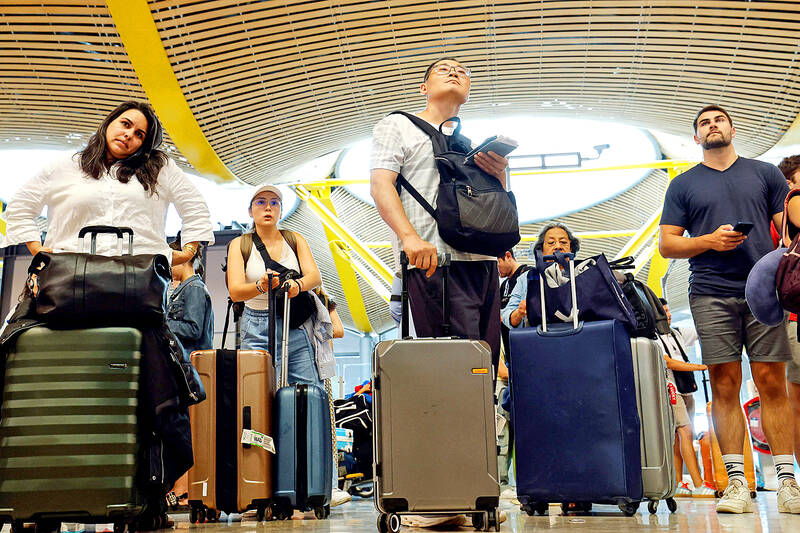Airlines, banks, TV channels and other business across the globe were scrambling yesterday to deal with one of the biggest IT crashes over the past few years, caused by an update to an antivirus software.
Aviation officials in the US briefly grounded all planes, while airlines elsewhere canceled or delayed flights, as systems running Microsoft Windows crashed.
Microsoft said the issue began at 7pm GMT on Thursday, affecting users of its Azure cloud platform running cybersecurity software CrowdStrike Falcon.

Photo: AFP
“We recommend customers that are able to, to restore from a backup from before this time,” the US software giant said in a technical update on its Web site.
CrowdStrike CEO George Kurtz in a post on several social media platforms said that a fix had been rolled out for the problem, describing it as a “defect found in a single content update for Windows hosts.”
Experts suggested applying the fix would not be straightforward.
The global nature of the failure prompted some commentators to question the reliance on a single provider for such a variety of services.
Shares in CrowdStrike slumped by 20 percent in premarket trading.
From Amsterdam to Zurich, Singapore to Hong Kong, airport operators flagged technical issues that were disrupting their services.
Some airports told planes they could not land, while in others airline staff began checking in passengers manually.
“I’m just in limbo as to how long I’ve got to wait here,” traveler Alexander Ropicano told reporters as he waited at Sydney Airport in Australia.
The 24-year-old, flying to Brisbane to see his girlfriend, said the airline told him to “wait until the system is operational again.”
The US Federal Aviation Administration in a notice to airlines early yesterday said that all flights “regardless of destination” were to be grounded.
However, American Airlines later said that as of 9am GMT “we have been able to safely re-establish our operation.”
“We apologize to our customers for the inconvenience,” the airline said.
Major airports including Berlin, which had suspended flights earlier yesterday, said departures and arrivals were gradually resuming.
Meanwhile, Taiwan Taoyuan International Airport said its airline systems got disrupted.
Airlines including AirAsia X, Tigerair Taiwan, Jetstar Airways, HK Express Airways, Jeju Air and Scoot were affected by the technical issue, the airport said.
Airline staff resorted to conducting passenger registration and seat allocation procedures manually, after Microsoft cloud-based booking-management system Navitaire was impacted by the outage, airport authorities said.
The Ministry of Digital Affairs issued a statement saying the ministry “inspected the status and operations of critical government information systems,” including the household registration and tax systems, as soon as the technical issue was discovered.
Critical government information systems were not affected and were operating normally, although some personal computers had malfunctioned, the ministry said.
Additional reporting by CNA

SECURITY: As China is ‘reshaping’ Hong Kong’s population, Taiwan must raise the eligibility threshold for applications from Hong Kongers, Chiu Chui-cheng said When Hong Kong and Macau citizens apply for residency in Taiwan, it would be under a new category that includes a “national security observation period,” Mainland Affairs Council (MAC) Minister Chiu Chui-cheng (邱垂正) said yesterday. President William Lai (賴清德) on March 13 announced 17 strategies to counter China’s aggression toward Taiwan, including incorporating national security considerations into the review process for residency applications from Hong Kong and Macau citizens. The situation in Hong Kong is constantly changing, Chiu said to media yesterday on the sidelines of the Taipei Technology Run hosted by the Taipei Neihu Technology Park Development Association. With

CARROT AND STICK: While unrelenting in its military threats, China attracted nearly 40,000 Taiwanese to over 400 business events last year Nearly 40,000 Taiwanese last year joined industry events in China, such as conferences and trade fairs, supported by the Chinese government, a study showed yesterday, as Beijing ramps up a charm offensive toward Taipei alongside military pressure. China has long taken a carrot-and-stick approach to Taiwan, threatening it with the prospect of military action while reaching out to those it believes are amenable to Beijing’s point of view. Taiwanese security officials are wary of what they see as Beijing’s influence campaigns to sway public opinion after Taipei and Beijing gradually resumed travel links halted by the COVID-19 pandemic, but the scale of

A US Marine Corps regiment equipped with Naval Strike Missiles (NSM) is set to participate in the upcoming Balikatan 25 exercise in the Luzon Strait, marking the system’s first-ever deployment in the Philippines. US and Philippine officials have separately confirmed that the Navy Marine Expeditionary Ship Interdiction System (NMESIS) — the mobile launch platform for the Naval Strike Missile — would take part in the joint exercise. The missiles are being deployed to “a strategic first island chain chokepoint” in the waters between Taiwan proper and the Philippines, US-based Naval News reported. “The Luzon Strait and Bashi Channel represent a critical access

Pope Francis is be laid to rest on Saturday after lying in state for three days in St Peter’s Basilica, where the faithful are expected to flock to pay their respects to history’s first Latin American pontiff. The cardinals met yesterday in the Vatican’s synod hall to chart the next steps before a conclave begins to choose Francis’ successor, as condolences poured in from around the world. According to current norms, the conclave must begin between May 5 and 10. The cardinals set the funeral for Saturday at 10am in St Peter’s Square, to be celebrated by the dean of the College